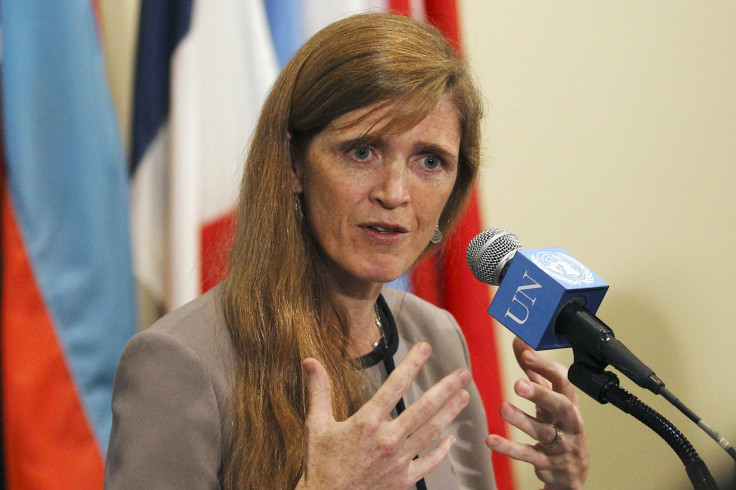U.S. Does Not Expect UN Approval For Military Strike On Syria, Accuses Russia Of Holding Security Council Hostage

The U.S., on Thursday, suggested that it might not wait for an approval from the United Nations before launching a military strike against Syria, and blamed Russia for holding the 15-nation Security Council hostage by using its veto power and forcing the U.S. to act unilaterally.
Samantha Power, the U.S. ambassador to the UN, told reporters that the U.S. would not address the Syrian crisis in the U.N. Security Council anymore, and accused Russia of protecting its ally, Syria, which is widely believed to have used chemical weapons against its citizens, according to a Reuters report.
“Russia continues to hold the council hostage and shirk its international responsibilities, including as a party to the Chemical Weapons Convention," Power told reporters at the UN in New York, Politico reported.
"Our considered view, after months of efforts on chemical weapons and after 2-1/2 years of efforts on Geneva (peace talks), the humanitarian situation is that there is no viable path forward in this Security Council," she said, according to Reuters.
The U.S. and its allies claim that Assad’s regime was behind a poisonous sarin gas attack on Aug. 21 near the Syrian capital of Damascus, which killed more than 1,400 people including more than 400 children. However, Assad and its strongest ally, Russia, blame the rebel forces for the deadly attacks. Assad's regime has been accused, in the past, of carrying out similar chemical attacks against its citizens.
Russia, which has veto power in the U.N. Security Council, has at least three times in the past blocked resolutions against Assad’s government, and the U.S. government believes that it would continue to do so in the future.
"I was present in the meeting where the UK laid down the resolution, and everything in that meeting, in word and in body language, suggests that that resolution has no prospect of being adopted, by Russia in particular," Power said, Reuters reported.
Russian President Vladimir Putin, on Wednesday, said that he would not rule out backing a military strike on Syria, if there was solid evidence that the Syrian government used banned chemical weapons. However, he maintained that Russia remained unconvinced about claims made by the U.S. that Assad’s regime used chemical weapons, and warned the U.S. against acting unilaterally without the Security Council's approval.
The U.S. said that it has shared critical evidence against the Syrian government with Russia, China and its other partners and allies, but Russia, in its bid to save Assad’s government, chose to ignore the evidence.
Power also said that the U.N. Security Council had failed to live up to its mandate of acting as an international watchdog to maintain peace and security, and that it had failed to protect the rights of hundreds of Syrian children.
"Unfortunately for the past 2-1/2 years, the system devised in 1945 precisely to deal with threats of this nature did not work as it is supposed to," Power said, Reuters reported. "It did not protect peace and security for the hundreds of Syrian children who were gassed to death on August 21."
"The system has protected the prerogatives of Russia, the patron of a regime that would brazenly stage the world's largest chemical weapons attack in a quarter century while chemical weapons inspectors sent by the United Nations were just across town," she added.
A U.N.-appointed investigation team has collected samples from the site of the alleged chemical attacks, but it could be weeks before the report's findings are released. However, the U.N. team is only expected to report on whether a chemical weapon attack took place in Syria or not, and will not assign responsibility for the attack.
© Copyright IBTimes 2025. All rights reserved.






















